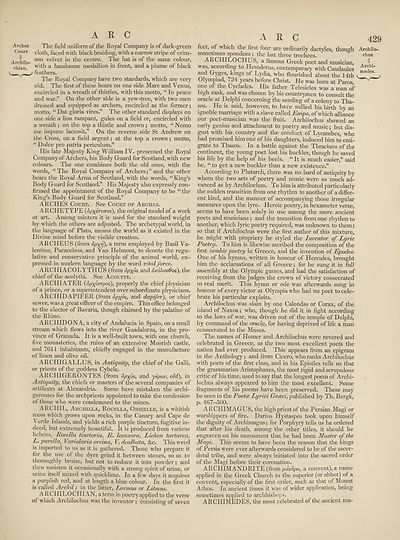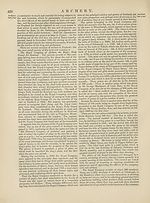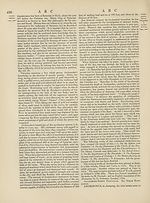Encyclopaedia Britannica > Volume 3, Anatomy-Astronomy
(437) Page 429
Download files
Complete book:
Individual page:
Thumbnail gallery: Grid view | List view

AEG
The field uniform of the Royal Company is of dark-green
cloth, faced with black braiding, with a narrow stripe of crim¬
son velvet in the centre. The hat is of the same colour,
with a handsome medallion in front, and a plume of black
feathers.
The Royal Company have two standards, which are very
old. The first of these bears on one side Mars and Venus,
encircled in a wreath of thistles, with this motto, “ In peace
and war.” On the other side is a yew-tree, with two men
dressed and equipped as archers, encircled as the former;
motto, “ Dat gloria vires.” The other standard displays on
one side a lion rampant, gules on a field or, encircled with
a wreath ; on the top a thistle and crown ; motto, “ Nemo
me impune lacessit.” On the reverse side St Andrew on
the Cross, on a field argent; at the top a crown; motto,
“ Dulce pro patria periculum.”
His late Majesty King William IV. presented the Royal
Company of Archers, his Body Guard for Scotland, with new
colours. The one combines both the old ones, with the
words, “The Royal Company of Archers;” and the other
bears the Royal Arms of Scotland, with the words, “King’s
Body Guard for Scotland.” His Majesty also expressly con¬
firmed the appointment of the Royal Company to be “ the
King’s Body Guard for Scotland.”
A RCHES Court. See Court of Arches.
ARCHETYPE (dp^eniTros), the original model of a work
ot art. Among minters it is used for the standard weight
by which the others are adjusted. The archetypal world, in
the language of Plato, means the world as it existed in the
Divine mind before the visible creation.
ARCHE US (from apxy), a term employed by Basil Va¬
lentine, Paracelsus, and Van Helmont, to denote the regu¬
lative and conservative principle of the animal world, ex¬
pressed in modern language by the word vital force.
ARCHIACOLYTHUS (from dp^os and aKoXovOof), the
chief of the acolythi. See Acolyte.
ARCHIATER (dpytarpos), properly the chief physician
of a prince, or a superintendent over subordinate physicians.
ARCHIDAPIFER (from dp^ds, and dapifer), or chief
sewer, was a great officer of the empire. This office belonged
to the elector of Bavaria, though claimed by the palatine of
the Rhine.
ARCH ID ON A, a city of Andalucia in Spain, on a small
stream which flows into the river Guadalorza, in the pro¬
vince of Granada. It is a well-built town, with one church,
five monasteries, the ruins of an extensive Moorish castle,
and 7611 inhabitants, chiefly engaged in the manufacture
of linen and olive oil.
ARCHIGALLUS, in Antiquity, the chief of the Galli,
or priests of the goddess Cybele.
ARCHIGERONTES (from dp^ds, and yepwv, old), in
Antiquity, the chiefs or masters of the several companies of
artificers at Alexandria. Some have mistaken the archi-
gerontes for the archpriests appointed to take the confession
ot those who were condemned to the mines.
ARCHIL, Archilla, Rocella, Orsielle, is a whitish
moss which grows upon rocks, in the Canary and Cape de
V erde Islands, and yields a rich purple tincture, fugitive in¬
deed, but extremely beautiful, It is produced from various
lichens, Rocella tinctoria, R. lecanora, Lichen tartarea,
Ij. parella, Variolaria orcina, V. dealhata, &c. This weed
is imported to us as it is gathered. Those who prepare it
for the use of the dyer grind it between stones, so as to
thoroughly bruise, but not to reduce it into powder; and
then moisten it occasionally with a strong spirit of urine, or
urine itself mixed with quicklime. In a few days it acquires
a purplish red, and at length a blue colour. In the first it
is called Archil; in the latter, Lacmus or Litmus.
A RC HI LOCH I AN, a term in poetry applied to the verse
of which Archilochus was the inventor ; consisting of seven
arc
429
feet, of which the first four are ordinarily dactyles, though
sometimes spondees ; the last three trochees.
ARCHILOCHUS, a famous Greek poet and musician,
was, according to Herodotus, contemporary with Candaules
and Gyges,Jungs of Lydia, who flourished about the 14th
Olympiad, <24 years before Christ. He was born at Paros,
one of the Cyclades. His father Telesicles was a man of
high rank, and was chosen by his countrymen to consult the
oracle at Delphi concerning the sending of a colony to Tha-
sos. He is said, however, to have sullied his birth by an
ignoble marriage with a slave called Enipo, of which alliance
our poet-musician was the fruit. Archilochus showed an
early genius and attachment to poetry and music; but dis¬
gust with his country and the conduct of Lycambes, who
had promised him one of his daughters, induced him to emi¬
grate to Thasos. In a battle against the Thracians of the
continent, the young poet lost his buckler, though he saved
his life by the help of his heels. “ It is much easier,” said
he, “ to get a new buckler than a new existence.”
According to Plutarch, there was no bard of antiquity by
whom the two arts of poetry and music were so much ad¬
vanced as by Archilochus. To him is attributed particularly
the sudden transition from one rhythm to another of a differ¬
ent kind, and the manner of accompanying those irregular
measures upon the lyre. Heroic poetry, in hexameter verse,
seems to have been solely in use among the more ancient
poets and musicians ; and the transition from one rhythm to
another, which lyric poetry required, was unknown to them;
so that if Archilochus were the first author of this mixture,
he might with propriety be styled the Inventor of Lyric
Poetry. To him is likewise ascribed the composition of the
first iambic poetry in Greece, and the invention of Epodes.
One of his hymns, written in honour of Hercules, brought
him the acclamations of all Greece; for he sung it in full
assembly at the Olympic games, and had the satisfaction of
receiving from the judges the crown of victory consecrated
to real merit. This hymn or ode was afterwards sung in
honour of every victor at Olympia who had no poet to cele¬
brate his particular exploits.
Archilochus was slain by one Calondas or Corax, of the
island of Naxos; who, though he did it in fight according
to the laws of war, was driven out of the temple of Delphi,
by command of the oracle, for having deprived of life a man
consecrated to the Muses.
The names of Homer and Archilochus were revered and
celebrated in Greece, as the two most excellent poets the
nation had ever produced. This appears from an epigram
in the Anthology; and from Cicero, who ranks Archilochus
with poets of the first class, and in his Epistles tells us that
the grammarian Aristophanes, the most rigid and scrupulous
critic of his time, used to say that the longest poem of Archi¬
lochus always appeared to him the most excellent. Some
fragments of his poems have been preserved. These may
be seen in the Poetce Lyrici Greed, published by Th. Bergk,
p. 467-500.
ARCHIMAGUS, the high priest of the Persian Magi or
worshippers of fire. Darius Hystaspes took upon himself
the dignity of Archimagus; for Porphyry tells us he ordered
that after his death, among the other titles, it should be
engraven on his monument that he had been Master of the
Magi. This seems to have been the reason that the kings
of Persia were ever afterwards considered to be of the sacer¬
dotal tribe, and were always initiated into the sacred order
of the Magi before their coronation.
ARCHIMANDRITE (from pavlpa, a convent), a name
applied in the Greek Church to the superior (or abbot) of a
convent, especially of the first order, such as that of Mount
Athos. In ancient times it was of wider application, being
sometimes applied to archbishops.
ARCHIMEDES, the most celebrated of the ancient ma-
The field uniform of the Royal Company is of dark-green
cloth, faced with black braiding, with a narrow stripe of crim¬
son velvet in the centre. The hat is of the same colour,
with a handsome medallion in front, and a plume of black
feathers.
The Royal Company have two standards, which are very
old. The first of these bears on one side Mars and Venus,
encircled in a wreath of thistles, with this motto, “ In peace
and war.” On the other side is a yew-tree, with two men
dressed and equipped as archers, encircled as the former;
motto, “ Dat gloria vires.” The other standard displays on
one side a lion rampant, gules on a field or, encircled with
a wreath ; on the top a thistle and crown ; motto, “ Nemo
me impune lacessit.” On the reverse side St Andrew on
the Cross, on a field argent; at the top a crown; motto,
“ Dulce pro patria periculum.”
His late Majesty King William IV. presented the Royal
Company of Archers, his Body Guard for Scotland, with new
colours. The one combines both the old ones, with the
words, “The Royal Company of Archers;” and the other
bears the Royal Arms of Scotland, with the words, “King’s
Body Guard for Scotland.” His Majesty also expressly con¬
firmed the appointment of the Royal Company to be “ the
King’s Body Guard for Scotland.”
A RCHES Court. See Court of Arches.
ARCHETYPE (dp^eniTros), the original model of a work
ot art. Among minters it is used for the standard weight
by which the others are adjusted. The archetypal world, in
the language of Plato, means the world as it existed in the
Divine mind before the visible creation.
ARCHE US (from apxy), a term employed by Basil Va¬
lentine, Paracelsus, and Van Helmont, to denote the regu¬
lative and conservative principle of the animal world, ex¬
pressed in modern language by the word vital force.
ARCHIACOLYTHUS (from dp^os and aKoXovOof), the
chief of the acolythi. See Acolyte.
ARCHIATER (dpytarpos), properly the chief physician
of a prince, or a superintendent over subordinate physicians.
ARCHIDAPIFER (from dp^ds, and dapifer), or chief
sewer, was a great officer of the empire. This office belonged
to the elector of Bavaria, though claimed by the palatine of
the Rhine.
ARCH ID ON A, a city of Andalucia in Spain, on a small
stream which flows into the river Guadalorza, in the pro¬
vince of Granada. It is a well-built town, with one church,
five monasteries, the ruins of an extensive Moorish castle,
and 7611 inhabitants, chiefly engaged in the manufacture
of linen and olive oil.
ARCHIGALLUS, in Antiquity, the chief of the Galli,
or priests of the goddess Cybele.
ARCHIGERONTES (from dp^ds, and yepwv, old), in
Antiquity, the chiefs or masters of the several companies of
artificers at Alexandria. Some have mistaken the archi-
gerontes for the archpriests appointed to take the confession
ot those who were condemned to the mines.
ARCHIL, Archilla, Rocella, Orsielle, is a whitish
moss which grows upon rocks, in the Canary and Cape de
V erde Islands, and yields a rich purple tincture, fugitive in¬
deed, but extremely beautiful, It is produced from various
lichens, Rocella tinctoria, R. lecanora, Lichen tartarea,
Ij. parella, Variolaria orcina, V. dealhata, &c. This weed
is imported to us as it is gathered. Those who prepare it
for the use of the dyer grind it between stones, so as to
thoroughly bruise, but not to reduce it into powder; and
then moisten it occasionally with a strong spirit of urine, or
urine itself mixed with quicklime. In a few days it acquires
a purplish red, and at length a blue colour. In the first it
is called Archil; in the latter, Lacmus or Litmus.
A RC HI LOCH I AN, a term in poetry applied to the verse
of which Archilochus was the inventor ; consisting of seven
arc
429
feet, of which the first four are ordinarily dactyles, though
sometimes spondees ; the last three trochees.
ARCHILOCHUS, a famous Greek poet and musician,
was, according to Herodotus, contemporary with Candaules
and Gyges,Jungs of Lydia, who flourished about the 14th
Olympiad, <24 years before Christ. He was born at Paros,
one of the Cyclades. His father Telesicles was a man of
high rank, and was chosen by his countrymen to consult the
oracle at Delphi concerning the sending of a colony to Tha-
sos. He is said, however, to have sullied his birth by an
ignoble marriage with a slave called Enipo, of which alliance
our poet-musician was the fruit. Archilochus showed an
early genius and attachment to poetry and music; but dis¬
gust with his country and the conduct of Lycambes, who
had promised him one of his daughters, induced him to emi¬
grate to Thasos. In a battle against the Thracians of the
continent, the young poet lost his buckler, though he saved
his life by the help of his heels. “ It is much easier,” said
he, “ to get a new buckler than a new existence.”
According to Plutarch, there was no bard of antiquity by
whom the two arts of poetry and music were so much ad¬
vanced as by Archilochus. To him is attributed particularly
the sudden transition from one rhythm to another of a differ¬
ent kind, and the manner of accompanying those irregular
measures upon the lyre. Heroic poetry, in hexameter verse,
seems to have been solely in use among the more ancient
poets and musicians ; and the transition from one rhythm to
another, which lyric poetry required, was unknown to them;
so that if Archilochus were the first author of this mixture,
he might with propriety be styled the Inventor of Lyric
Poetry. To him is likewise ascribed the composition of the
first iambic poetry in Greece, and the invention of Epodes.
One of his hymns, written in honour of Hercules, brought
him the acclamations of all Greece; for he sung it in full
assembly at the Olympic games, and had the satisfaction of
receiving from the judges the crown of victory consecrated
to real merit. This hymn or ode was afterwards sung in
honour of every victor at Olympia who had no poet to cele¬
brate his particular exploits.
Archilochus was slain by one Calondas or Corax, of the
island of Naxos; who, though he did it in fight according
to the laws of war, was driven out of the temple of Delphi,
by command of the oracle, for having deprived of life a man
consecrated to the Muses.
The names of Homer and Archilochus were revered and
celebrated in Greece, as the two most excellent poets the
nation had ever produced. This appears from an epigram
in the Anthology; and from Cicero, who ranks Archilochus
with poets of the first class, and in his Epistles tells us that
the grammarian Aristophanes, the most rigid and scrupulous
critic of his time, used to say that the longest poem of Archi¬
lochus always appeared to him the most excellent. Some
fragments of his poems have been preserved. These may
be seen in the Poetce Lyrici Greed, published by Th. Bergk,
p. 467-500.
ARCHIMAGUS, the high priest of the Persian Magi or
worshippers of fire. Darius Hystaspes took upon himself
the dignity of Archimagus; for Porphyry tells us he ordered
that after his death, among the other titles, it should be
engraven on his monument that he had been Master of the
Magi. This seems to have been the reason that the kings
of Persia were ever afterwards considered to be of the sacer¬
dotal tribe, and were always initiated into the sacred order
of the Magi before their coronation.
ARCHIMANDRITE (from pavlpa, a convent), a name
applied in the Greek Church to the superior (or abbot) of a
convent, especially of the first order, such as that of Mount
Athos. In ancient times it was of wider application, being
sometimes applied to archbishops.
ARCHIMEDES, the most celebrated of the ancient ma-
Set display mode to:
![]() Universal Viewer |
Universal Viewer | ![]() Mirador |
Large image | Transcription
Mirador |
Large image | Transcription
Images and transcriptions on this page, including medium image downloads, may be used under the Creative Commons Attribution 4.0 International Licence unless otherwise stated. ![]()
| Encyclopaedia Britannica > Encyclopaedia Britannica > Volume 3, Anatomy-Astronomy > (437) Page 429 |
|---|
| Permanent URL | https://digital.nls.uk/193763029 |
|---|
| Attribution and copyright: |
|
|---|---|
| Shelfmark | EB.16 |
|---|---|
| Description | Ten editions of 'Encyclopaedia Britannica', issued from 1768-1903, in 231 volumes. Originally issued in 100 weekly parts (3 volumes) between 1768 and 1771 by publishers: Colin Macfarquhar and Andrew Bell (Edinburgh); editor: William Smellie: engraver: Andrew Bell. Expanded editions in the 19th century featured more volumes and contributions from leading experts in their fields. Managed and published in Edinburgh up to the 9th edition (25 volumes, from 1875-1889); the 10th edition (1902-1903) re-issued the 9th edition, with 11 supplementary volumes. |
|---|---|
| Additional NLS resources: |
|

